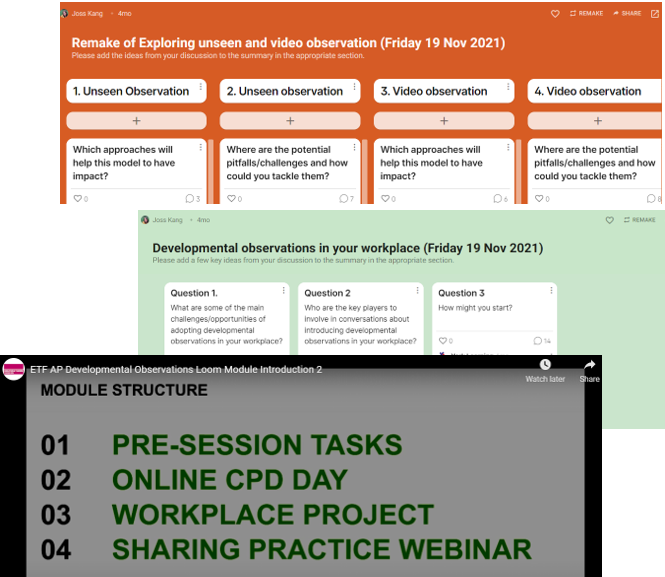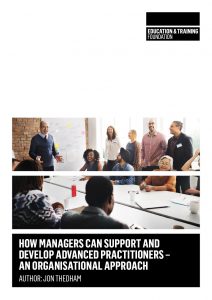Developmental Observations and Leading AP Teams: Advanced Practice Modules by Joanne Miles
What did the participants gain?

Resources from expert-led CPD module ‘Developmental Observations’ designed and delivered by Joanne Miles and Professor Matt O’Leary
It has been a delight and a privilege to be one of the module leaders for the Education and Training Foundation’s ‘Professional Development Programme for Advanced Practitioners’, known as #APConnect. Over the last four years I have seen this work gather momentum and take on a life of its own, as Advanced Practitioners gain confidence and skills, connect with others and build strength in community for professional learning. Live and virtual networking events abound to share thinking and practices to support colleagues and develop teaching and learning and there are a wealth of podcasts, blogs and articles amplifying this work across the sector – it all emanates from this group of dynamic and passionate Advanced Practitioners. The energy, drive, creativity and insight in this community is impressive to me.
For the last two years I have worked in collaboration with Professor Matt O’Leary to develop and deliver two Advanced Practice Modules for the #APConnect programme. After decades teaching and training in the FE sector, I am now a freelance coach, trainer and consultant with a focus on developing coaching and reflection skills, action research cycles and developmental observation, so I was keen to bring practical insights from the sector to this programme. Matt brought a wealth of research insight, authorship and also experience in HE and teacher education, so we could bring differing perspectives and expertise to the discussions.
Module Design
Using effective practice principles from research on professional learning, we designed the Advanced Practice Modules on Developmental Observations and Leading AP Teams with a similar structure, to allow for learning and implementation over time:
- Pre-session research reading and Padlet for responses/reflections (Autumn 2021)
- Zoom live online full training day
- Additional reading list with links
- Workplace project
- Coaching circles in small clusters to reflect on project progress (January 2022)
- Live Zoom sharing practice webinar with original cohort
- Padlet for Sharing reflections with the wider FE sector
- National AP Conference – March 2022
This module structure supported our cohorts in relating insights from research to their own work context, as well as enabling them to gather practical approaches from the presenters and their cohort colleagues.
Made me realise that for years staff have been asked to do peer observation but not included in training on how to have pre/post observation discussions (i.e working on basic coaching toolkit) and action needs to be taken here. (Developmental Observations delegate)
From appointment, I knew what I wanted to achieve. However, from the outset of this module, the guidance, advice and support have given me a much greater understanding and depth of what it needs to look like, and how we (as an organisation) need to develop this. The FETL Project report that scaffolded this module has been pivotal to me and my organisation. (Leading AP Teams delegate)
It has been interesting to explore the role of collegial leadership and the implications it has for the AP role. It is clear from the research presented that a teacher-driven, collaborative approach is the most effective, particularly if supported by an outstanding practitioner or equivalent. I was particularly interested to hear about the Teaching Triangles and also the experience of others in my group about their experience of the AP role. Learning from the presenters and colleagues, I clarified my understanding of what could work and what might not work. The November tutorial (coaching circle) also helped clarify my thinking around rebranding the AP role and the importance of involving staff in shaping the role and the process. Thank you #APConnect for really making me think about this. (Leading AP Teams delegate)
So far I’ve gained contact with a valued colleague in the FE sector, access to Professor O’Leary’s research (and his highlighting of key areas in our last meeting), and it’s meant a ‘good idea’ is now being realised instead of let go. (Leading AP Teams delegate)
Learning about Observation Models and Reflective Practice
Delegates commented on the value of having time and space to hear about and discuss different models for observation and approaches to reflective dialogue. The programme gave people a chance to broaden their practical toolkit and also develop their thinking through dialogue with others in space and time free of workplace constraints:
It has opened my eyes to the other methods of developing teaching and learning rather than just observing and giving feedback. (Developmental Observations delegate)
My thinking has developed during the module due to attending the online support sessions with others on this journey and gaining advice and ideas from the coaching circle sessions with Joanne. (Leading AP Teams delegate)
The learning from attendance at the session enabled my thinking to be developed to take a fresh look at the landscape and the notion of the Why, How and Wow – linked to the intent, implementation and impact. (Leading AP Teams delegate)
I’m taking away the different options that we can use for observation. (Developmental Observations delegate)
Learning from Peers
One of the valuable aspects of a national development programme is the opportunity to meet others from different organisations and contexts and for thinking and practice to be shared and explored. On this programme we noted an open, generous spirit of honest sharing, both of challenges and approaches that have helped. It was a joy to see the cohorts voicing issues and very real difficulties but with an ethos of solution-focused discussion as they supported each other to think further. This safe, creative trouble-shooting space has great value to support, reassure and re-energise people as they grapple with aspects of their demanding development role. In my experience it is often very powerful to access such spaces outside your organisation to allow for the stimulation of fresh viewpoints and practice from beyond your own context.
For me, the key takeaway from the session so far has been suggestions re overcoming some of the barriers to implementing developmental observations – many of my questions answered. (Developmental Observations delegate)
Thank you everyone for being an open cohort, willing to discuss and try things. I’ve gained a lot from our discussions. (Developmental Observations delegate)
Really great conversation from our group, focusing on teacher responsibility and how to drive this across the organisations in which we work. (Developmental Observations delegate)
Some good ideas and tips shared in the breakout rooms. (Developmental Observations delegate)
This has been aspirational and influential. Thank YOU! Everything has been gold but simply having this platform to exchange ideas and solutions with like-minded colleagues has been invaluable. (Leading AP Teams delegate)
Thank you – feeling very enthused to go and get started 🙂 (Developmental Observations delegate)
Insights about Cultures
As the cohorts reflected together on the input from our live day, some delegates had powerful realisations about the cultures where they worked:
During the first online session I realised that reflection was an area of weakness. We had not invested any time in training or developing staff knowledge therefore how did we know they were skilled in reflective practice? This was confirmed after speaking to staff therefore a training need was established and became a priority. A training session was planned for an appropriate point in the process. (Leading AP Teams delegate)
I spend 3 hours in the classroom observing a session. I think this time would be better spent in dialogue/coaching the tutor! (Developmental Observations delegate)
We’re on the right path having already started using Teaching Triangles, but still need to be patient – it’s a long process not a quick fix (Developmental Observations delegate)
APs’ Skills Palette
In our live training day there was also a refreshingly open attitude to discussing APs’ personal skills for the role. There is clearly an appetite among APs to develop themselves further and this echoed through every session we ran. In my experience APs can benefit from a range of support and development related to reflective dialogue plus advanced coaching and project management skills and over the last few years, the #APConnect programme has given this vital group some relevant development which is difficult to find elsewhere.
I want to develop my coaching skills in developmental observations. I will be taking away the tips from Jo and her pre-session video. I will be watching this again and then will try out some of the techniques mentioned. (Developmental Observations delegate)
Thought provoking: model better the practice we seek to develop in others; Take away: create space for teachers to share fears and anxieties about the new process…Personal skills: ask shorter and more directed questions. (Developmental Observations delegate)
Coaching Circles

How Managers Can Support and Develop Advanced Practitioners – An Organisational Approach by Jon Thedham. Part of the Education and Training Foundation’s AP Toolkit. The Toolkit comprises a further 5 Guides, AP Reflective Accounts, Professional Development Cards and two research reports.
Our coaching circle sessions to encourage reflection on the progress with workplace projects proved to be engaging and supportive spaces where the cohorts could share whatever they had done so far, even if it was simply vision/planning for a future project. Julie Sinclair shared the coaching circle model with me and together we devised a session structure to model it to our cohorts. We were delighted to hear that several of them had actually taken the model itself into their own practice subsequently:
One benefit for me was The Coaching Circle that Julie demonstrated to us. I have used it and found it really useful and the teachers I worked with loved it. I have since tried it with students. They led it and it worked well. (Developmental Observations delegate)
In the coaching circle sessions and the sharing practice webinars, we heard how the Covid pandemic has created additional challenges and disruption in workplaces, making it even more difficult than usual to implement new models or processes. However, the APs showed their persistence and flexibility in adapting timescales of work, using champions and volunteers to get projects started and often opting for smaller-scale pilots to explore a new approach and gather feedback as evidence to enable a wider roll-out in future. This blend of pragmatism, drive and creativity is useful in all development work and was much in evidence here. As one of the delegates on the Leading AP Teams programme noted:
Persistent positivity and a real can do attitude are essential to influence a large number of stakeholders, especially if there’s any distance.
Appreciation
In our current context in the sector, I am impressed to see how much some APs had managed to achieve over the last few months and their workplace projects can be viewed on the Padlets. There are many practical models and processes showcased there as well as a range of interesting insights and reflections for review. Thank you to all the delegates who attended our modules – it has been a pleasure to work with you, thank you for sharing so much with all of us and please let us know how your exciting work develops. Another big thank you to Professor Matt O’Leary for all your input and collaboration on these modules and to Julie Sinclair for bringing her coaching skills and insights to our coaching circle sessions. Finally thanks to touchconsulting Ltd and Joss Kang in particular for bringing me into this exceptional project.

